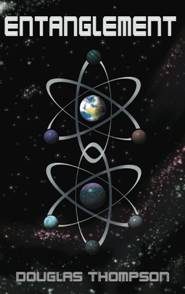In Douglas Thompson's future, humanity has reached the stars through quantum teleportation. From the opening, even the mode of travel takes on a metaphysical dimension: the dupliport chamber can create a double of an astronaut, but not their "soul"; human consciousness has to shuttle over the light years - the epitome of Einstein's spooky action at a distance. Entanglement is the story of the men and women who explore the stars, and of the conundrums they find out there. Sex, death, religion, culture: everything is open to question.
It can be read as either an episodic novel, or a collection of short stories, but needs to be followed in chronological order. There's a large cast of characters, but the book is held together by the programme's directors, Gene Vesperg and Hilary Fording. Thompson doesn't flinch from showing us the costs of exploration. The programme begins badly; the first human volunteer is condemned to an atrocious fate as a kind of ghost, which later stalks Vesperg throughout his life. And this is before we even leave Earth.
The first chapter, Entanglement, poses the first challenge to human assumptions. Here, a wonderfully unreliable narrator begins to question the nature of life after death, chasing alien wraiths on the dark side of a tidally-locked world. In Escaladore, other travellers discover that the cycles of birth and death are far less cut-and-dried than humans believe. There are no invaders here; few of the alien races encountered here are actively hostile, with the exception of the Grey-like Zetans of A Trip To The Zoo. The conflicts here are of psychology, communication, philosophy, and humans cannot always bridge the gap. Some travellers attempt to, at a cost; in one of the book's outstanding stories, In Time Like Glass, astronauts encounter a horse-like race with little concept of memory:
"You talk to me as if I have lived many lives and will live many again… and this strikes me as superstition, or a religious belief, not a tangible or helpful reality."
In the beautiful, tragic Aviariss, a woman attempts to communicate with the planet's bird-like natives using classical music. Other species reject us because their word for war is synonymous with illness, or consider our ideas of gender and reproduction abhorrent. There are misunderstandings on many worlds, unwitting killings of intelligent life; many contacts with other races leave characters questioning their identity, questions that will not go away and have no easy answer. Early on, Gene Vesburg asks himself:
"Consciousness can't encounter consciousness without contamination, alteration, transformation?"
And Fording contemplates her children and wonders why we carry "the mud and blood of hell on Earth" out into space, if indeed that's where we're meant to be. Thompson doesn't give us stock heroes, just flawed men and women who drift into meaningless affairs, doubt their own actions, make mistakes that will be their undoing. He gives us recognisable human beings.
That's not to say Entanglement is utterly bleak. Far from it: there's a lot of (often dark) humour here, much of it connected to the duplication of the astronauts. A character might suddenly become dismembered in a restaurant as her other self becomes subject to an autopsy light years away; human beings can briefly become the subjects of an alien cargo cult. There's plenty of a good old fashioned sense of wonder here too. None of Entanglement's travellers lack curiosity, even though it might result in transformation or death. It argues that in meeting the alien, we meet ourselves; that to ask questions is better than presenting glib solutions. If anything, it's a novel that pleads the case for cautious optimism.
If Entanglement has one fault, it's that I'd have cheerfully spent more reading time on many of these planets; they deserve novellas, at the very least. Thompson doesn't waste time on technobabble; like Ursula Le Guin (who he pays homage to by using the term "Ansible") he's more interested in humans than machinery. It's a thoughtful, ambivalent, compassionate novel. I wish there were more science fiction like it.
~
Mat Joiner lives near Birmingham. His stories and poems have appeared in Never Again, Not One Of Us, and Strange Horizons.




